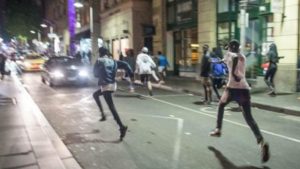Home » Commentary » Opinion » Migrants must integrate — that’s a fact
· DAILY TELEGRAPH
 Melbourne is seemingly only now finding out what Sydney has long known: ‘politically correct’ multiculturalism hinders integration and leads to social problems.
Melbourne is seemingly only now finding out what Sydney has long known: ‘politically correct’ multiculturalism hinders integration and leads to social problems.
Melbourne’s African gang crisis shows how lucky we are that Australia has never practiced the kind of mushy-headed multiculturalism long preached by many inner-city elites.
The politically correct argument is that newcomers should retain and practice the customs and habits of their homeland, and Australian society should adapt to accommodate this in the name of tolerance.
But when forced to confront real cultural ‘diversity’ — marauding gangs of Sudanese youths whose behaviour suggests warring tribesmen in violent clan struggles — proponents of multiculturalism have engaged in mass denial.
This has been exemplified by the tweets from an ABC journalist and a prominent left-wing judge, downplaying the crisis and claiming that no-one they know or who lives in their suburbs is fearful of gang violence.
This might actually be true: high property prices in well-off locations allow many elites to buy their way out of direct exposure to the problem.
The irony is that many of the same people, so complacent about gang violence, took to the streets in protest when journalist Jill Meagher was raped and murdered in the fashionable suburb of Brunswick by serial offender Adrian Bayley.
But when the citizens of outer-metropolitan areas complain regarding gang violence and about essentially the same problem — lax administration of law and order — they are condemned as racist ‘deplorables’.
The reality of immigration is that culture matters, and will determine how easily (or otherwise) migrant and refugees can fit in.
Fortunately, our immigration policies have been based on the common sense principle that newcomers should be expected to adapt to Australian culture — not the other way around.
Due to factors such as the skills-based nature of the immigration programme, most migrants have easily conformed to core Australian values such as the rule of law, parliamentary democracy, and the ‘fair go’ for all.
The successful integration of migrants from around the globe has made Australia perhaps the most harmonious multi-racial nation in the world.
This has been aided by migrants being self-selecting. Those who choose to start a new life are generally likely to have the will and ability to fit in and make a go of the opportunities afforded by their new homeland.
Refugees, however, are a special case. They have not come by choice, but have been forced to leave their countries because of war or political turmoil, and may therefore lack the skills and knowledge needed to cope with life in a very different society.
One in three recent immigrants from the Middle East and North Africa, who are mainly refugees, are unemployed. The unemployment rate for this group is six times higher than the national average, and much higher than for newcomers from Asian and Southern and eastern European countries — most of who arrive as immigrants not refugees.
Refugees need far more intensive support and government-funded services to make the transition to living here.
The extra expense to taxpayers is why we need to cap the number of refugees accepted each year — and is also why we need strong border protection policies to enforce those caps.
This is also why we need to be hard-headed about immigration policy and reject unrealistic policies, such as the 50,000 annual refugee intake proposed by the Australian Greens.
The kind of debate about immigration that has been sparked by the recent events in Melbourne is commonplace in many European countries, where Middle Eastern and north African newcomers’ failure to integrate has frayed the social fabric.
Australia, thankfully, does not face anything like the same challenges France, Germany, and Sweden do.
Sydney-siders are, however, more familiar with these kinds of problems than those in other states.
This is due to the well-known unemployment, crime and other social problems that exist in parts of Western Sydney centred around Lakemba. The sad fact is that some Lebanese Muslim Australians, mostly from refugee backgrounds and families, have failed to repeat the successful path of education, work, and integration that is the norm for most immigrant groups — including the wave of Christian Lebanese who preceded them.
Community concerns about immigration have also been reinforced by recent instances of home-grown Islamic terrorism that have usually involved offenders from Middle-Eastern backgrounds.
In response, politicians are increasingly rejecting fluffy multicultural sentiment. And it isn’t only Coalition hardliners such as Peter Dutton who are preaching the need for all Australians to be held to the same cultural standards.
Labor MPs have also acknowledged the need for a robust commitment to Australian values. Hence, even Labor opposition education minister, Tanya Pilbersek recently said a future Labor government will encourage all schoolchildren to learn and recite Australia’s citizenship pledge — to promote commitment to our democratic beliefs, laws, and liberties.
Jeremy Sammut is a Senior Research Fellow at The Centre for Independent Studies.
Migrants must integrate — that’s a fact